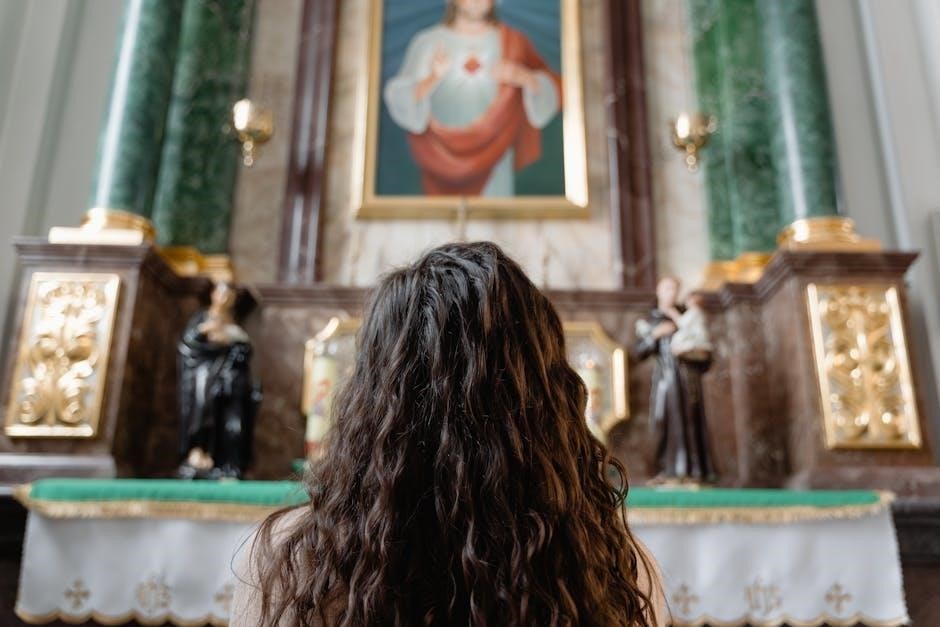The book of Exodus explores Israel’s deliverance from Egypt, highlighting themes of redemption and divine intervention. Bible study guides provide structured frameworks for deeper understanding, fostering meaningful reflection and discussion among participants.
1.1 Overview of the Book of Exodus
The Book of Exodus narrates the Israelites’ dramatic escape from Egyptian slavery, led by Moses, and their journey to the Promised Land. It begins with their oppression in Egypt, followed by God’s intervention through the ten plagues, culminating in the parting of the Red Sea. The book also recounts the giving of the Law at Mount Sinai, establishing Israel’s covenant with God. Structurally, Exodus is divided into sections: Israel’s suffering in Egypt, the Exodus itself, the wilderness wanderings, and the revelation at Sinai. Themes include redemption, divine presence, and covenant obligations, making Exodus a foundational text for understanding God’s relationship with His people.

1.2 Purpose of Bible Study Guides

Bible study guides are designed to enhance understanding and engagement with Scripture. They provide structured lessons, questions, and reflections to deepen comprehension of the text. These resources are ideal for both personal devotion and group discussions, fostering a deeper connection with God’s Word. By breaking down complex themes and events, they make the Bible more accessible. Guides often include study notes, cross-references, and practical applications, helping participants apply biblical truths to their lives. They encourage active learning, prompting readers to think critically and reflect on the relevance of ancient stories in modern contexts. This structured approach ensures a meaningful and enriching study experience.

Key Events and Themes in Exodus
Exodus recounts the Israelites’ deliverance from Egypt, showcasing God’s power through the plagues and the parting of the Red Sea. Moses’ leadership and divine guidance highlight redemption and covenant, central to Israel’s identity and faith journey.
2.1 The Israelites in Egypt and the Plagues
The Israelites endured harsh slavery in Egypt, prompting God to intervene with ten plagues to demonstrate His power and compel Pharaoh’s release of His people. The plagues, escalating in severity, included the Nile turning to blood, frogs, gnats, and the death of every firstborn son. These divine judgments highlighted God’s sovereignty and compassion, ultimately leading to the Israelites’ liberation. The plagues serve as a testament to God’s faithfulness and His plan to redeem His people, forming a cornerstone of biblical history and faith.
2.2 The Parting of the Red Sea
The parting of the Red Sea is a miraculous event where God provided a path for the Israelites to escape Pharaoh’s pursuing army. Trapped between the sea and their oppressors, the Israelites witnessed God’s divine intervention. Moses, acting in faith, stretched his staff over the water, and God sent a strong east wind to divide the sea, creating dry land for the Israelites to cross safely. This act of deliverance demonstrated God’s power and faithfulness, solidifying the Israelites’ trust in Him. The Red Sea’s parting is a timeless symbol of divine salvation and redemption, emphasizing the importance of trusting God in times of crisis.

2.3 Moses and the Burning Bush
Moses’ encounter with the burning bush is a pivotal moment in Exodus, marking God’s direct intervention in his life. While tending his father-in-law’s flocks on Mount Horeb, Moses noticed a bush that burned without being consumed by fire. This miraculous sight drew him closer, and God spoke to him from the bush, identifying Himself as the God of Abraham, Isaac, and Jacob. God commissioned Moses to lead the Israelites out of Egypt, despite Moses’ initial hesitation and feelings of inadequacy. The burning bush symbolizes God’s presence and divine authority, emphasizing His power to act in human history. This event underscores themes of divine calling, obedience, and trust in God’s plan, setting the stage for Moses’ leadership role in the Exodus narrative.

Bible Study Questions and Answers
This section provides answers to common questions about Exodus, covering key events like the plagues and the Red Sea crossing, with multiple-choice questions for deeper understanding.
3.1 Questions on Key People and Events
Engage with Exodus through targeted questions about its central figures and pivotal moments. Explore Moses’ leadership, the significance of the burning bush, and the parting of the Red Sea. Multiple-choice questions test knowledge of the 10 plagues, Pharaoh’s resistance, and the Israelites’ journey. Reflect on the role of faith in Moses’ obedience and the symbolic meaning of the Passover.
Consider how these events reveal God’s covenant with His people. These inquiries encourage deeper understanding and personal application, making Exodus relevant to modern spiritual growth and challenges; Reflection questions prompt users to connect ancient stories with contemporary life, fostering a meaningful study experience.

3.2 Answers to Common Questions About Exodus
Key questions about Exodus often focus on its theological and historical significance. For instance, the book outlines the Israelites’ 430-year stay in Egypt and their miraculous deliverance. Common inquiries include the purpose of the 10 plagues, the symbolism of the Passover, and the parting of the Red Sea. Answers highlight God’s redemption plan and His covenant with Israel. Another frequent question concerns Moses’ leadership and his encounter with the burning bush, emphasizing faith and obedience. Theological discussions often explore how Exodus foreshadows Christ’s sacrifice, with the Passover symbolizing redemption. These answers provide clarity, deepen understanding, and connect ancient events to modern spiritual life, making Exodus a cornerstone of biblical study.

Theological Significance of Exodus
Exodus highlights God’s redemption plan, showcasing divine deliverance and covenant faithfulness. The Passover symbolizes salvation, foreshadowing Christ’s sacrifice. It underscores God’s presence and sovereignty in human history.
4.1 The Concept of Redemption
The concept of redemption in Exodus is central, highlighting God’s deliverance of the Israelites from Egyptian slavery. This theme is epitomized through the Passover, where the blood of the lamb symbolizes redemption from sin and death. The parting of the Red Sea further underscores God’s power to rescue His people, foreshadowing Christ’s ultimate redemption through His sacrifice. These events demonstrate God’s faithfulness and love, emphasizing the theological significance of redemption as a divine act of salvation. Redemption in Exodus serves as a foundation for understanding God’s plan of deliverance, both in the Old Testament and through Jesus Christ in the New Testament.
4.2 The Role of the Passover

The Passover is a pivotal event in Exodus, symbolizing redemption and divine deliverance. It commemorates the night God spared the Israelites from the tenth plague by marking their homes with the blood of a lamb. This act of obedience demonstrated faith in God’s promise of salvation. The Passover serves as a reminder of Israel’s liberation from Egyptian bondage and God’s covenant faithfulness. It also foreshadows Jesus Christ’s sacrifice, as the lamb’s blood prefigures His atonement for humanity’s sins. The Passover ritual, including the Seder meal, continues to be observed, emphasizing remembrance, gratitude, and the enduring hope of redemption through God’s gracious intervention.

Applying Exodus to Modern Life
Exodus teaches trust in God’s deliverance, courage in adversity, and leadership principles. Its themes inspire modern believers to stand against oppression and trust divine providence.
5.1 Lessons on Faith and Leadership
Moses’ journey in Exodus offers profound lessons on faith and leadership. His encounter with the burning bush symbolizes trust in God’s plan, even when faced with uncertainty. Leading the Israelites through the Red Sea demonstrates courage and reliance on divine guidance. These events highlight the importance of servant leadership, humility, and obedience. Modern leaders can draw parallels by embracing faith during crises and trusting God’s sovereignty. Moses’ leadership shows that true strength lies in surrendering to God’s will, providing a timeless model for leaders today. His story encourages believers to step out in faith, even when challenges seem insurmountable.
5.2 Parallels to Modern-Day Oppression
The Exodus narrative vividly portrays the Israelites’ suffering under Egyptian oppression, offering timeless parallels to modern-day struggles. Just as Pharaoh’s regime enslaved and exploited, contemporary systems of oppression—such as systemic racism, social inequality, and political tyranny—mirror similar patterns of domination. The Exodus story reminds us that God sees the afflicted and hears their cries, inspiring hope for liberation. It challenges believers to stand against injustice and advocate for the marginalized. By reflecting on Exodus, we can draw strength to address modern oppression, trusting in God’s promise to deliver the downtrodden and bring justice. This ancient story remains a powerful call to action for today’s world.